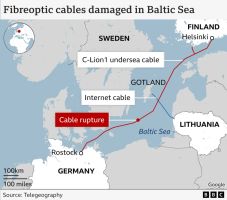 Early Monday morning, a 1,170km (730-mile) telecommunications cable in the Baltic Sea between Finland and Germany was severed, while a 218km internet link between Lithuania and Sweden’s Gotland Island stopped working on Sunday.
Early Monday morning, a 1,170km (730-mile) telecommunications cable in the Baltic Sea between Finland and Germany was severed, while a 218km internet link between Lithuania and Sweden’s Gotland Island stopped working on Sunday.
German Defense Minister Boris Pistorius has said damage to two undersea cables looks like an act of sabotage and a “hybrid action”, without knowing who is to blame.
The incidents came at a time of heightened tension with Russia and Pistorius said “nobody believes that these cables were cut accidentally”, reports the BBC.
The Swedish and Lithuanian defense ministers said they were “deeply concerned” that the cable connecting their two countries had been cut.
“Situations like these must be assessed with the growing threat posed by Russia in our neighborhood as a backdrop,” ministers Pal Jonson and Laurynas Kasciunas said in a statement, with a call for sanctions to be used in response to acts of sabotage.
Germany and Finland also expressed grave concern on Monday in response to the severing of the C-Lion1 communications cable. They issued a joint statement that read:
We are deeply concerned about the severed undersea cable connecting Finland and Germany in the Baltic Sea. The fact that such an incident immediately raises suspicions of intentional damage speaks volumes about the volatility of our times. A thorough investigation is underway. Our European security is not only under threat from Russia‘s war of aggression against Ukraine, but also from hybrid warfare by malicious actors. Safeguarding our shared critical infrastructure is vital to our security and the resilience of our societies.
A series of incidents involving Baltic pipelines have heightened fears of sabotage since Russia’s full-scale invasion of Ukraine.
Finnish telecoms and cyber security firm Cinia said its cable may have been severed “by an outside force”. “These kinds of breaks don’t happen in these waters without an outside impact,” a spokesperson told local media.
“The reasons are under investigation. Disturbances occur from time to time and there can be various reasons. For example, they are susceptible to weather and damage caused by shipping. The essential thing is that the problems are identified and corrective measures are taken,” said Samuli Bergström, communications chief at the Finnish National Cyber Security Centre Traficom.
Bergström confirmed that the interruption affects Finland’s international connections.
“However, it is good to keep in mind that data connections out of Finland go from several different places. Now one of these connections is broken, which may burden others [but the effects are] probably not visible to the average citizen,” he said.
Thanks to Alaric Bond for contributing to this post.
